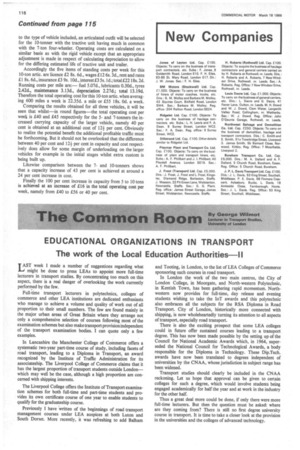EDUCATIONAL ORGANIZATIONS IN TRANSPORT The work of the Local Education Authorities—II
Page 118

If you've noticed an error in this article please click here to report it so we can fix it.
T AST week I made a number of suggestions regarding what
might be done to press LEAs to appoint more full-time lecturers in transport studies. By concentrating too much on this aspect, there is a real danger of overlooking the work currently performed by the few.
Full-tune transport lecturers in polytechnics, colleges of commerce and other LEA institutions are dedicated enthusiasts who manage to achieve a volume and quality of work out of all proportion to their small numbers. The few are found mainly in the major urban areas of Great Britain where they arrange not only a comprehensive selection of courses following most of the examination schemes but also make transport provision independent of the transport examination bodies. I can quote only a few examples.
In Lancashire the Manchester College of Commerce offers a systematic two-year part-time course of study, including facets of road transport, leading to a Diploma in Transport, an award recognized by the Institute of Traffic Administration for its associateship. The Liverpool College of Commerce claims that it has the largest proportion of transport students outside London— which may well be the case, although a high proportion are concerned with shipping interests.
The Liverpool College offers the Institute of Transport examination schemes for both full-time and part-time students and provides its own certificate course of one year to enable students to qualify for the graduateship course.
Previously I have 'written of the beginnings of road transport management courses under LEA auspices at both Luton and South Dorset. More recently, it was refreshing to add Bantam and Tooting, in London, to the list of LEA Colleges of Commerce sponsoring such courses in road transport.
In London the work of the two main centres, the City of London College, in Moorgate, and North-western Polytechnic, in Kentish Town, has been gathering rapid momentum. Northwestern now provides for full-time, day release and evening students wishing to take the IoT awards and this polytechnic also embraces all the subjects for the RSA Diploma in Road Transport. City of London, historically more connected with shipping, is now wholeheartedly turning its attention to all aspects of transport, especially road transport.
There is also the exciting prospect that some LEA colleges could in future offer sustained courses leading to a transport degree. This has now been made possible by the setting up of the Council for National Academic Awards which, in 1964, superseded the National Council for Technological Awards, a body responsible for the Diploma in Technology. These Dip.Tech. awards have now been translated to degrees independent of universities by the CNAA, whose jurisdiction in subject range has been widened.
Transport studies should clearly be included in the CNAA reckoning. Let us hope that approval can be given to certain colleges for such a degree, which would involve students being engaged academically for half the year and at work in the industry for the other half.
Thus a great deal more could be done, if only there were more full-time lecturers. But then the question must be asked: where are they coming from? There is still no first degree university course in transport. It is time to take a closer look at the provision in the universities and the colleges of advanced technology.




































































































































































